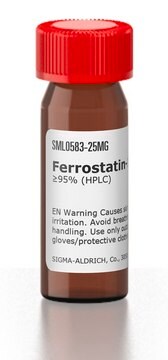SRP4193
IL-33 human
recombinant, expressed in E. coli, ≥98% (SDS-PAGE), ≥98% (HPLC)
Sinônimo(s):
C9orf26, DKFZp586H0523, DVS27, NF-HEV, NFEHEV, RP11-575C20
Faça loginpara ver os preços organizacionais e de contrato
About This Item
Código UNSPSC:
12352202
NACRES:
NA.32
Produtos recomendados
fonte biológica
human
recombinante
expressed in E. coli
Ensaio
≥98% (HPLC)
≥98% (SDS-PAGE)
forma
lyophilized
peso molecular
~18.1 kDa
embalagem
pkg of 10 μg
Impurezas
endotoxin, tested
nº de adesão NCBI
Condições de expedição
wet ice
temperatura de armazenamento
−20°C
Informações sobre genes
human ... IL33(90865)
Descrição geral
IL-33 (interleukin 33) is a potent immunomodulatory cytokine that belongs to the IL-1 family, which also includes IL-1β and IL-18. This protein as first identified as a nuclear factor showing predominant expression in human high endothelial venules. IL-33 shows high expression levels in endothelial cells and epithelium, such as keratinocytes, that are in direct contact with the environment.
Recombinant human IL-33 produced from Escherichia coli is a non-disulfide-linked homodimeric, non-glycosylated polypeptide chain consisting of 160 amino acids and having a total molecular mass of 18.1kDa.
Recombinant human IL-33 produced from Escherichia coli is a non-disulfide-linked homodimeric, non-glycosylated polypeptide chain consisting of 160 amino acids and having a total molecular mass of 18.1kDa.
Ações bioquímicas/fisiológicas
IL-33 (interleukin 33) functions as an extracellular cytokine, and also translocates to the nucleus where it inhibits gene expression. It acts as a ligand for ST2/ IL-1 receptor-like 1 (growth STimulation expressed gene 2), and ST2 is expressed on cells such as CD34+ hematopoietic progenitor cells, eosinophils, basophils, T-helper 2 cell (Th2), and dendritic, NK (natural killer), endothelial and mast cells. Polymorphisms in this gene as well as its receptor are linked with atopic dermatitis, allergies and asthma. This protein is also thought to function as a profibrogenic cytokine, signaling through ST2, where it facilitates the stimulation and progression of fibrosis in different types of organs and tissues, such as pulmonary, liver, and uterine leiomyoma. In renal transplant recipients, the increased levels of IL-33 might be implicated in the pathogenesis of chronic allograft dysfunction (CAD).
forma física
Sterile filtered and lyophilized with 10 mM sodium phosphate, pH 7.5.
Reconstituição
Centrifuge the vial prior to opening. Avoid freeze-thaw cycles.
Reconstitute in water to a concentration of 0.1-1.0 mg/mL. The solution can then be diluted into other aqueous buffers.
Código de classe de armazenamento
11 - Combustible Solids
Classe de risco de água (WGK)
WGK 3
Ponto de fulgor (°F)
Not applicable
Ponto de fulgor (°C)
Not applicable
Certificados de análise (COA)
Busque Certificados de análise (COA) digitando o Número do Lote do produto. Os números de lote e remessa podem ser encontrados no rótulo de um produto após a palavra “Lot” ou “Batch”.
Já possui este produto?
Encontre a documentação dos produtos que você adquiriu recentemente na biblioteca de documentos.
The Potential Role of IL-33 in Renal Transplant Recipients with Chronic Allograft Dysfunction.
Zhang J et al
Annals of Transplantation : Quarterly of the Polish Transplantation Society, 21, 611-618 (2016)
Esophageal Epithelial-Derived IL-33 Is Upregulated in Patients with Heartburn.
Sei H et al
PLoS ONE, 11(4), e0154234-e0154234 (2016)
Targeting the IL-1 family members in skin inflammation.
Jensen LE
Current Opinion in Investigational Drugs, 11(11), 1211-1220 (2010)
Ying Lei et al.
PloS one, 10(7), e0133774-e0133774 (2015-07-28)
In several clinical and experimental studies IL-33 and its receptor have been found to play important roles in the development of asthma and allergic airway inflammation. We evaluated the effects of vaccination against IL-33 in a mouse model of airway
Elizabeth A Oczypok et al.
The Journal of allergy and clinical immunology, 136(3), 747-756 (2015-05-02)
Single nucleotide polymorphisms in the human gene for the receptor for advanced glycation end-products (RAGE) are associated with an increased incidence of asthma. RAGE is highly expressed in the lung and has been reported to play a vital role in
Nossa equipe de cientistas tem experiência em todas as áreas de pesquisa, incluindo Life Sciences, ciência de materiais, síntese química, cromatografia, química analítica e muitas outras.
Entre em contato com a assistência técnica